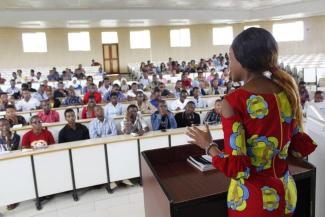We believe that locally generated knowledge and solutions are key to solving local and global challenges
Supporting Southern research and higher education institutions
INASP has worked in partnership with Southern universities and research institutions for over 30 years.
We've worked with colleagues to make global research more accessible to Southern researchers, and to make Southern research more visible to the rest of the world. We have provided training and mentoring to many thousands of researchers so that they can publish and communicate their work.
Yet much of the funding and many of the partnerships are focused on a small group of well-established universities, often in major cities. While that deep support can be valuable, it can also entrench existing inequities.
We believe that a more diverse research and higher education system is needed. We work particularly with universities in second cities and rural areas, who are often closely connected to their communities and local economies, and use digital learning to offer support to researchers and educators wherever they are based.
Communicating research and getting published
Researchers across the world face the pressure to publish, but Southern researchers often don't have access to the resources, information, training, and support networks they need. Our AuthorAID community addresses this directly.
An award-winning community-led platform, AuthorAID brings researchers together to learn and share knowledge. Each year, AuthorAID's flexible courses in research writing, communicating to non-academic audiences, and proposal writing reach over 7,500 from 130 countries. Its online "journal clubs" allow researchers to connect with and learn from their peers, while its mentoring and collaboration platform assists early career researchers to make connections to experienced colleagues and build their own network.
The community is led by our Stewards, a team of experienced researchers and research communicators from across the world - spanning Bangladesh, India, Pakistan, Nepal, Australia, Kenya, Nigeria, USA and Mexico.
Find out more about our programme of online courses.
Engaging with policy and practice to maximise impact
Researchers and universities want their research to have an impact, whether that is by influencing policy debates or by being accessible to practitioners. To do this researchers and research teams need to understand the people they're trying to reach and to devise effective strategies to engage them in the research process.
Through practical sessions we assist them to think about their end users, map the policy context, identify opportunities for engagement and influence, and understand how to communicate more effectively.
We also offer an online course Research Communication for Policy Engagement.
Get in touch if you think we can help.
Transforming university learning to improve graduate outcomes
Across the world universities face a common challenge: how can they ensure their students develop the skills, competencies and confidence they need to thrive in an ever-changing economy, and to lead change in their communities and societies?
We work with academic staff to rethink their approach to teaching, to become facilitators of learning instead of just lecturers. We work with universities to build new relationships with their communities, local businesses and government to make their programmes more relevant.
One example is our partnership with four universities in East Africa - together we've enabled over 550 academics to rethink their teaching, re-design their courses and improve learning for over 3,800 students in the process.
We do this by helping faculty to embed critical thinking and problem-solving skills into their curricula, and to make their learning environments more student-centred and more inclusive. Students tell us this empowers them as learners, helping them to think differently and to grapple critically with ideas and information.
You can read more about successful work with universities in Tanzania and Uganda and in Sierra Leone and explore the TransformHE site to learn more about the model we developed in partnership with East African colleagues.
Meet our experts here

